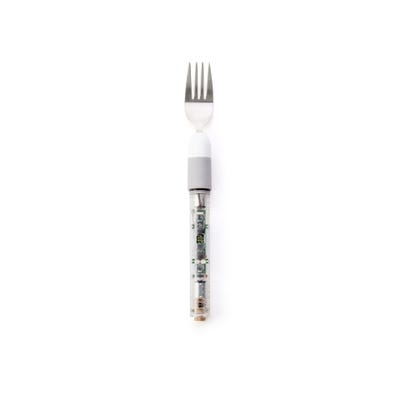Verily Adds to Liftware Assistive Technology Line
December 5, 2016
Formerly known as Google Life Sciences, Verily Life Sciences has launched Liftware Level computerized utensils for mobility-impaired individuals.
Maureen Kingsley

Verily Life Sciences, formerly Google Life Sciences, a subsidiary of Alphabet Inc., announced December 2 the commercial launch of its Liftware Level smart utensil for individuals with impaired mobility and fine motor control. The device uses a combination of hardware and software to make eating an easier, more successful, and more enjoyable activity for users.
Liftware Level includes an electronic, computerized steadying handle with spoon and fork attachments that work in tandem to recognize hand movement and constantly, intelligently adjust the angle of the utensil accordingly. The consumer device, whose launch was preceded by Verily's launch of a similar product, Liftware Steady, was designed to help people with limited hand and arm mobility related to cerebral palsy, spinal cord injury, Huntington's disease, post-stroke deficits, and other conditions eat with less spilling and greater ease.
Teaming up with Verily, the Huntington's Disease Society of America (HDSA), with a charitable contribution from Teva Pharmaceuticals, is running a donation program that provides complimentary Liftware Level Starter Kits to those in need. Donated devices will be given on a first-come, first-serve basis to the first 1000 individuals that apply through the HDSA website. Otherwise, Verily announced, the starter kit can be purchased through the company's online store as of December 1 for $195; that kit includes the handle, a soup-spoon attachment, a carrying pouch, a hand strap, and a battery charger. A fork attachment can be purchased separately for an additional $35, Verily states.
"For the estimated 30,000 Americans affected by Huntington's disease, loss of independence to perform simple daily tasks is devastating," said Louise Vetter, President and CEO of HDSA, in a press announcement. "We believe that the new Liftware Level device will help many more people be empowered to improve their quality of life and truly enjoy mealtime again."
Anupam Pathak, creator of Liftware and Technical Lead at Verily, said via press statement that "Liftware Level is a utensil designed to specifically address mealtime struggles facing individuals with limited mobility or range of motion. Designed and developed with significant input from physicians and potential users, we hope this new device will turn the everyday task of eating into a more pleasurable experience for more people living with movement disorders."
The Liftware devices, while designed for individuals with mobility-impairment-related medical conditions, are not medical devices and therefore do not require FDA clearance or approval.
Verily Life Sciences had previously developed a bit of a reputation for dreaming up big life-science technologies whose actual execution has been extremely challenging at best and prohibitive at worst. Its much-hyped "tricorder" for diagnosing cancer and other diseases, for instance, has not come to fruition, nor has its glucose-monitoring contact lenses. This Liftware line of smart assistive devices, however, while less fantastical than some of Verily's other product concepts, may serve to redeem the company in the eyes of its peers within the life-sciences R&D community.
Maureen Kingsley is a contributor to Qmed.
Like what you're reading? Subscribe to our daily e-newsletter.
[image courtesy of VERILY LIFE SCIENCES]
About the Author(s)
You May Also Like

.png?width=300&auto=webp&quality=80&disable=upscale)
